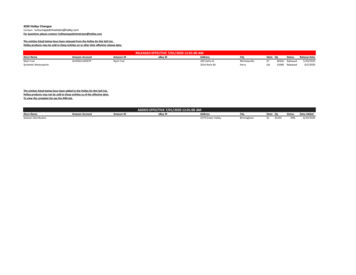
Transcription
About RickBEING21ways to feel goodabout yourselfBY: RICK HANSONRick Hanson, Ph.D.,is a psychologist,Senior Fellow of theGreater Good ScienceCenter at UC Berkeleyand New York Timesbest-selling author.His books include Resilient,Hardwiring Happiness, Buddha’sBrain, Just One Thing, and MotherNurture. Founder of the WellspringInstitute for Neurocience andContemplative Wisdom, he hasbeen an invited speaker at NASA,Oxford, Stanford, Harvard, andother major universities, andtaught in meditation centersworldwide. His work has beenfeatured on the BBC, CBS, andNPR, and he offers the free JustOne Thing newsletter with over120,000 subscribers, as well as theonline Foundations of Well-Beingprogram.www.rickhanson.net
1Do the right thing.The bliss of blamelessness. Practice the virtues that are thefoundation of any psychological growth or spiritual practice.2Tend to the causes of accomplishment.Do the things that will legitimately earn you success. All youcan do is feed the fruit tree; you can’t make it give you an apple.Take initiative, be “ardent, diligent, resolute and mindful,” andbe at peace with whatever happens. As Meher Baba said: “Don’tworry. Be happy. Make efforts.”3Love.Practice loving kindness for everyone, including (especially?!)neutral and difficult people. Feelings of love neutralize feelingsof shame.4Do things that ground you increasingly in asense of your own beingness, always alreadyawake, benign, and contented. For example, meditate, spendtime in nature, cuddle your children (or sweetie), do yoga, etc.5Relax “self”.Take things less personally. Give up trying to perfect yourself;that’s like trying to polish Jell-O.
6Accept yourself as you are.You are what you are, and you cannot change how you are inthis instant, though you can create the causes that will developyou in the future. But at any moment of now, there is nothingyou can do besides accept it and act to improve it. In particular,try to accept the vulnerable or not-so-pretty parts or your self;everyone has these; for example it is not bad to be anxious,sad, or needy.7Accept where you are in the four natural,unavoidable stages of learning and gettingbetter at anything: unconscious incompetence,conscious incompetence, conscious competence, unconsciouscompetence. The second stage – conscious incompetence – isthe hardest one, and it’s where people are prone to quit, butkeep going toward growing competence, which will supportyour sense of worth.8Serve the world.Donate to charity. Tend to your friends and family (includinganimal companions). Be nice to strangers.9Exercise your capacities.If you have talents lying fallow, start using them. “The mostexpensive piece of equipment is the one not making any money.”
10Reflect on your accomplishments andgood qualities each day.Perhaps take brief inventory before going to bed each night,answering questions like these: What did I get better attoday? How did I act with good character? What have Igotten done? In what ways did I help others?11Be in reality about the facts of who you are,and what you have done in your life (the good and the bad).See yourself as a mosaic with a hundred tiles, and tell thetruth about what is actually there; it’s always mostly good.12Be fair.You would want to be fair in your judgments of others; whydo you, another human being like them, deserve any less?13Take in the evidence of your own skills,contributions, accomplishments,loveableness, value to others.Fill that hole in your heart so that you become less hungryfor “narcissistic supplies” over time.
14Spend more time with people who like you.Perhaps even identify a kind of “go-to” or support team ofkey people who are major and credible validators of you, anddeepen your involvement with them.Spend less time with people who areneutral, indifferent, or negative toward you.If people are critical, it can help to reflect on the myriad factorsthat led them to treat you that way, which can put it in contextand make it feel less personal. If appropriate, stick up foryourself. If appropriate, ask others to stick up for you too.15Ask for appropriate positive feedback.It is a lot more useful to know what you are doing right thanwhat you are doing wrong, since the latter only tells you thatyou’re missing the target, not where it is or how to hit it.16Get a sense or image of internal nurturingand encouraging figures, such as the loving eyesof your doting grandmother, a guardian angel, or simply aclear voice of reason about your good qualities. Build up therealness of those internal “nurturing parent,” “protector,” or“guide” figures, and listen to them more often.
17Sort criticisms about you into four piles –“not valid,” “valid but to heck with it, I’m not going to changethat one,” “not a moral fault but worth putting in correctionfrom now on,” and “deserves a healthy wince of remorse”– take maximum reasonable responsibility for the thirdand fourth piles, make appropriate changes sincerely anddiligently (perhaps even specific amendments or expiationsfor serious wrongdoings), and move on.18Forgive yourself for your past misdeeds andyour present faults. This does not mean lettingyourself off the hook for them, but means instead not beratingor whipping yourself over and over for them. In a way, selfflagellation is a kind of avoidance of responsibility; when wetake true responsibility, there is a kind of forgiveness, an honestfacing and then a moving on. If you like, write out sentenceslike, “I forgive myself for ---.” Or imagine others forgiving you,like the other people involved, or beings who have a powerfulmeaning to you (e.g., a teacher, Jesus, the Buddha).19Stick up for yourself within yourself.Talk back to irrational or self-critical thoughts. Classicexamples: Comparing yourself to others (especially unfaircomparisons); equating the worth of who you are with thesuccess of what you do.
20See the empty nature of both your goodqualities and your bad ones.They are all compounded from smaller parts, they’re theresult of ten thousand factors (give or take a few), and theyarise and disappear interdependently with the whole wideworld; therefore, they have no inherent static independentexistence. They are simply qualities, some good, some bad.The good ones are worth encouraging, and the bad onesworth discouraging – for the sake of yourself and all beings –but none of them are worth identifying with.21 Treat yourself as if you matter.Listen to your innermost hopes and dreams, don’t dashthem, don’t rain on that parade, but encourage them inrealistic ways. Give yourself empathic attunement – whichmay have been in short supply when you were a child – foryour own feelings, being mindful of them, friendly towardsthem, and accepting (meditation is great for developing thisability). Let yourself let down sometimes; drop the load, putyour feet up, and relax; maybe you need a good cry, for real;build in routine times for rest and respite; take more longbaths, long walks, long lovemaking, long board gameswith the kids, long chats with good friends.
WANT MORE?Watch this video with Tips for Taking in the Good withRick and Forrest Hanson to find out how you can use yourthoughts to change your brain and be happier,healthier, and more well.
about yourself About Rick Rick Hanson, Ph.D., is a psychologist, Senior Fellow of the Greater Good Science Center at UC Berkeley and New York Times best-selling author. His books include Resilient, Hardwiring Happiness, Buddha's Brain, Just One Thing, and Mother Nurture. Founder of the Wellspring Institute for Neurocience and










